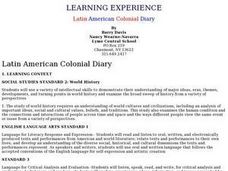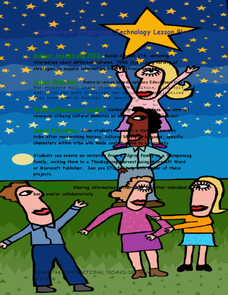Curated OER
Hair a disruption or personal expression?
When does hair (or clothing) disrupt the school process? This question is the topic of the argumentative paper your class with write. They read and react to an article about a boy who was expelled from school for sporting a Mohawk, then...
Diane Venzera
Kwanzaa Celebration: Celebrating Family, Community, and Culture
Kwanzaa is the focus of a three-part lesson that celebrates the history and traditions of the holiday. Before lighting the Kinara, scholars listen to a read-aloud of Seven Candles of Kwanzaa by Andrea Davis Pinkney. Learners express...
ProCon
School Uniforms
Americans spend around one billion dollars each year on school uniforms, but are they necessary? As pupils research the debate topic, they form their own opinions. They review the history of school uniforms and discover the top pro and...
Global Oneness Project
Deconstructing Consumerism
A short, engaging video provides a critique of the hyper-consumerist mentality that many think have taken over the Western world. After watching the video, pupils reflect on their own habits and use evidence...
EduGAINs
Consumerism, Me and the Natural Environment— Canadian and World Studies
Just as no man is an island, no country is totally independent of other countries. To understand the impact of individual consumer decisions on the global natural environment, class groups consider how the stuff they...
Curated OER
Latin American Colonial Diary
Students examine the class systems of New Spain. In small groups, they create a five-day diary about the family life, food, occupation, and government involvement of an assigned personality from the time of Colonial Latin America.
Curated OER
Cardboard Radial Weaving
Students explore cultural history by participating in an arts and crafts activity. In this weaving lesson, students identify the many cultures that used weaving methods and local plant life to create baskets and other useful tools....
Curated OER
Recreating Chinese Bronze Vessels
Students make Chinese Bronze Vessels using coil or slab-built clay ceramic techniques. They focus on various ceramic techniques essential to creating a carved ceramic box in the style of Chinese Bronze Vessels.
Curated OER
Courtship and Calligraphy in The Tale of Genji
Students discover through an examination of The Tale of Genji the importance of calligraphy to courtship rituals in the Japanese court culture of the late Heian period ( 897-1185). Three possible enrichment activities are included
Curated OER
Kente Straw Weavings
Fourth graders explore world culture by creating an arts and crafts project in class. In this weaving lesson, 4th graders identify the Kente culture and their uses for straw and other natural elements in their communities. Students...
Curated OER
Purim, Jewish Leaders, And The Roles We Choose
Students participate in the Jewish holiday of Purim. They are concerned with the idea of changing an identity for one day. The focus of this study is upon leadership as the students role play different leaders and make decisions to model...
Curated OER
Native Americans
First graders explore the lifestyles of several North American tribes. They investigate about the homes, food, transportation, and daily living habits of each tribe. Pupils use a map to locate several Native American tribes in North...
Curated OER
We Are Colony! Settlement Design
Students explore government systems. In this colonial America instructional activity, students consider colonial settlement needs as they design settlements that can sustain themselves and meet the needs of colonists.














